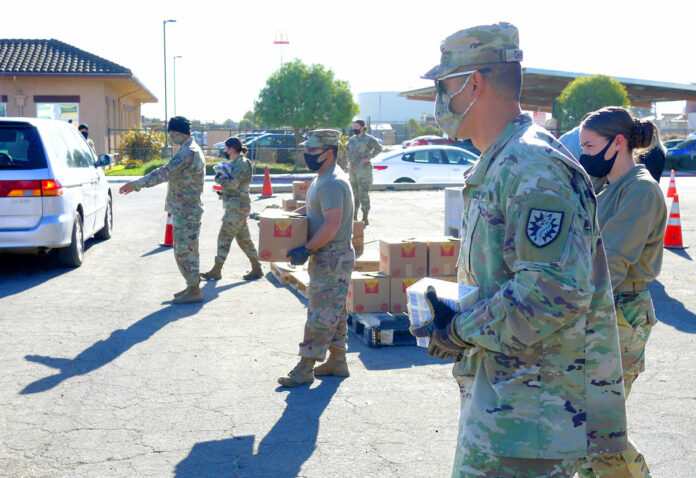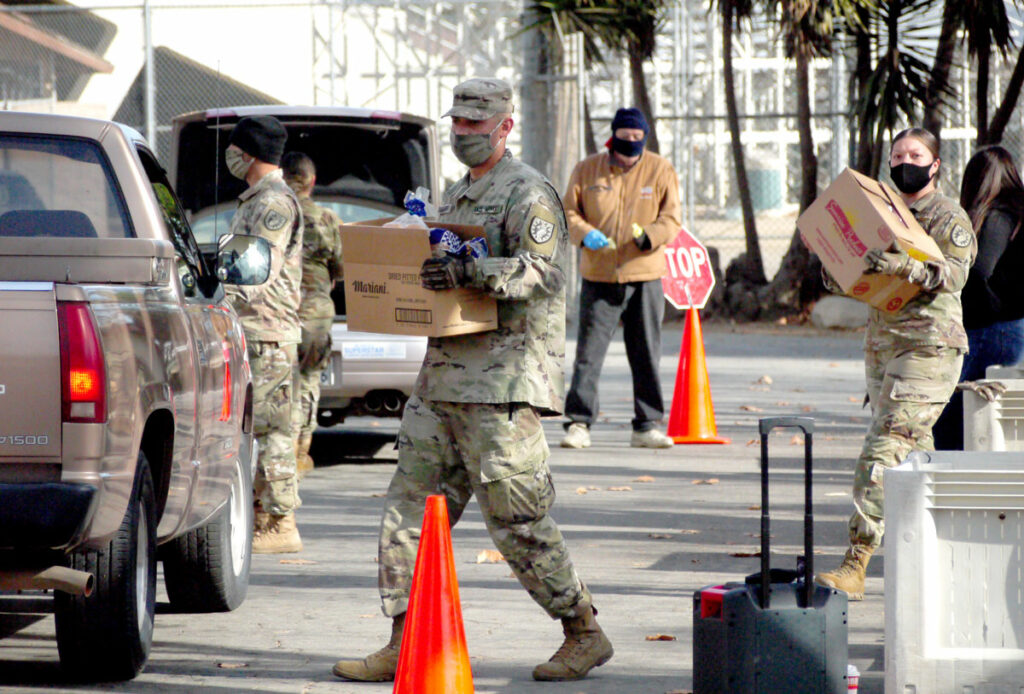
MONTEREY COUNTY — The ongoing Covid-19 pandemic has caused an increased need for food assistance, as evidenced by continued long lines at food distributions throughout Monterey County.
“The need increased earlier this year with the onset of Covid itself on the communities, but in terms of what we’re seeing right now, I don’t think it’s let off any,” said Chris Lopez, county supervisor for District 3, which includes South Monterey County.
When the pandemic hit, many of the county’s 160 nonprofit organizations were forced to close, according to Melissa Kendrick, Monterey County Food Bank executive director. Of those, only 60 remain open, many with limited services.
“Our numbers have quadrupled,” Kendrick said. “We’re just bracing for tremendous hardship.”
As a result, Monterey County Food Bank offers 50 food distributions per week, each of which see from 200 to 800 families. Kendrick said this has proven logistically challenging because of social distancing restrictions, which among other things require volunteers to place food directly into recipients’ trunks.
“We have had to completely reimagine how we do things,” she said.
All of this makes food banks’ missions difficult. Still, it happens thanks to “phenomenal” staff and to the ongoing donations that are the lifeblood of food banks, Kendrick said.
“I’ve noticed an increased need for food,” said Virginia Garcia, a volunteer with more than eight years’ experience of helping the Monterey County Food Bank.
Garcia, who volunteers at the Soledad, Greenfield and King City food distributions, said the supplies for 500 or more families continue to run out, and many have to be turned away during the latter parts of distribution days.

“We have to turn them away,” she said. “We don’t like doing that, but we’ve got no choice because there’s not enough food for everyone.”
Garcia said she volunteers in order to help others get the food they need, and shared the frustrations of families who are informed there is a limit of supplies for two families per vehicle, when there are at times representatives from three or more families in the car.
“We’re so lucky we have wonderful volunteers. They just are people that really want to help,” said Donna Myers, who ran the Community Food Pantry of King City, a charity that distributed food locally during the summer but had to shut down for the safety of its volunteer team.
Myers has since diverted donations to her organization to instead help with the county food bank’s local efforts.
“This food pantry has been not only helping feed the needy, but it has also helped to bring people to interact and help and to volunteer,” Myers said about the organization of more than 15 years, which was put on hold rather than operate during its usual April to November season.
From November to April, another organization, Loaves and Fishes, distributed food, and it has also shut down for volunteer safety.
Myers noted the ability of the local groups as being able to talk directly to families and customize their bags. Charities, like the food pantry, were able to provide such items as clothing.
“It’s one on one,” she said. “It’s not just handing them a bag or handing them a basket. So if somebody doesn’t want rice, we give them two beans.”
With new operating procedures, however, there is little interaction due to the necessity of health guidelines. Myers said there is a need for non-food items as more families find their financial resources depleted or limited.
“You can’t buy diapers with food stamps,” she explained. “If you don’t have enough money coming in, you don’t have diapers. You can’t buy toilet paper. There’s a real need out there.”
Part of the challenge of providing assistance, Kendrick said, is the sheer size of the county, which encompasses more than 3,770 square miles and includes a wide range of economic strata, from agricultural areas in the valley to tourist destinations along the bay.
“It wasn’t just Covid that impacted our communities this year,” Lopez said. “The fires took out a lot of crops. Grapes were impacted by smoke. People lost work. You couldn’t go harvest grapes if they weren’t going to harvest this year.”
He said the issue was exacerbated by a ripple effect as the initial economic damage hit other areas.
“Retail sales of vegetables and other crops were off, so the amount of things harvested has been reduced, and in that, the reverberation in our community is the lost work,” Lopez said.
People who worked minimum wage or piece rate were the most-affected by these shifts, he said.
The growing need was recognized early, according to Lopez, and the county has been working to help residents.
“Extensions were given for benefits,” said Lopez, adding that some requirements, such as showing proof of having worked certain amounts of time, were waived for assistance programs.
The county also has funded the Food Bank for Monterey County with more than $1 million this year, including several hundred dollars from CARES funding and half a million from cannabis funding.
“We’ve been continually funding the food bank to offset the impact on our community,” Lopez said. “Beyond that we’ve had a program in partnership with the United Way. We’ve put over $1.25 million into a fund that was offsetting people’s housing needs.”
The program was held in partnership with local cities, such as King City, Soledad, Gonzales and Salinas, where residents who could prove they were impacted by Covid-19 in either lost hours or becoming infected, could get assistance with making rent or utility payments.
“We’re trying to get as much of that money into the community to avoid the eviction crisis,” Lopez said.
As of last Friday, the City of Soledad still had funding available for residents in that program, which needed to be distributed before Dec. 30. To get information, residents should call 211.
Another recent program implemented at the beginning of December was a $1,000 stipend available to individuals who have been infected with Covid-19 and are willing to isolate and prove they are isolating for 10 days.
“We’re hoping that will offset people’s economic needs in that window and reduce the spread of the virus in our community,” Lopez said.
He called the incoming Covid-19 vaccines a “light at the end of the tunnel.” But while the economic damage impacts residents on a personal level, Lopez urged them to call 211 to see what assistance programs could help them.
“Don’t be afraid to reach out, there’s a lot of help available through 211,” he said. “We’ve partnered closely with them to make it easy to refer people to resources. … The Covid impact has been real on our economy and people should not be ashamed to ask for help.”
Food bank distributions take place in South Monterey County on a weekly basis. Mondays are in Soledad at 425 Gabilan Drive from 10 to 11 a.m. Tuesdays are in Greenfield at 615 El Camino Real from 10 to 11 a.m. and in Chualar at 24285 Lincoln St. from 12 to 1 p.m. Wednesdays are in King City at 625 Division St. from 10 to 11 a.m. and in San Ardo at Cattlemen and College roads from 11 a.m. to 12 p.m. Thursdays are in Gonzales at 116 S. Belden St. from 9:30 to 10:30 a.m.
Todd Guild contributed to this article.













